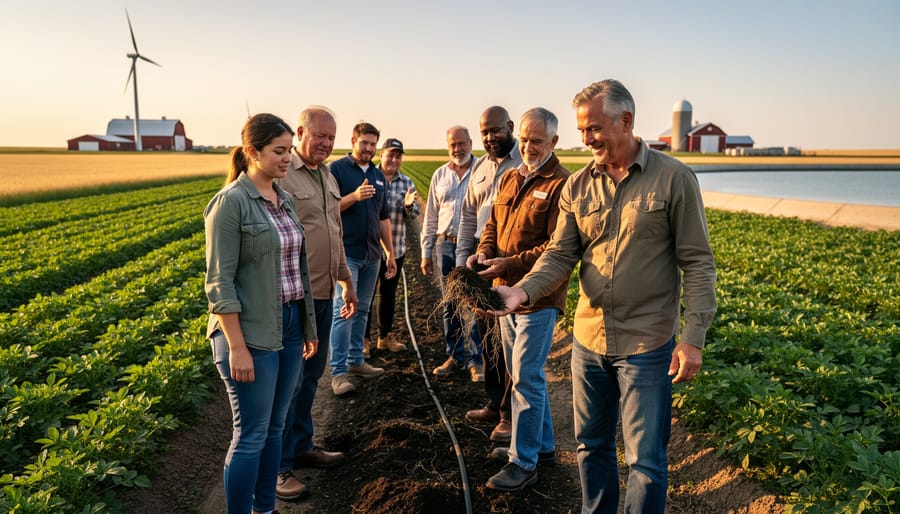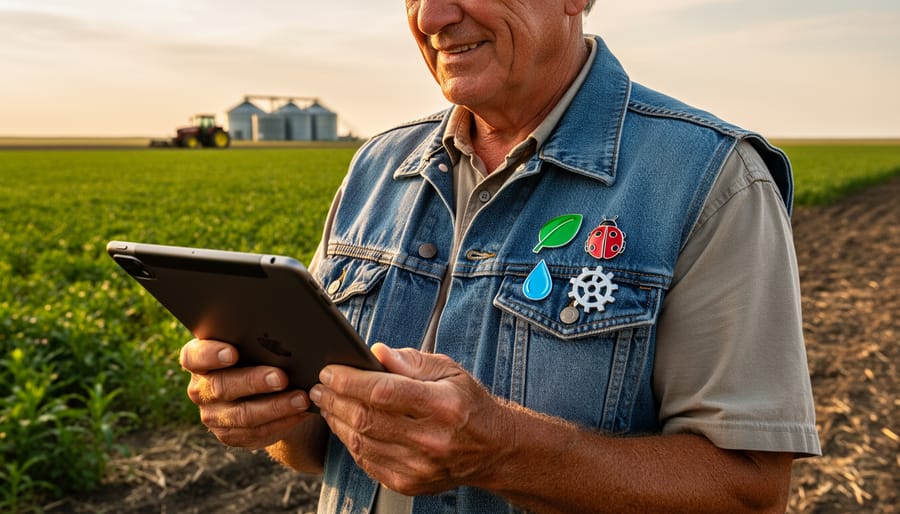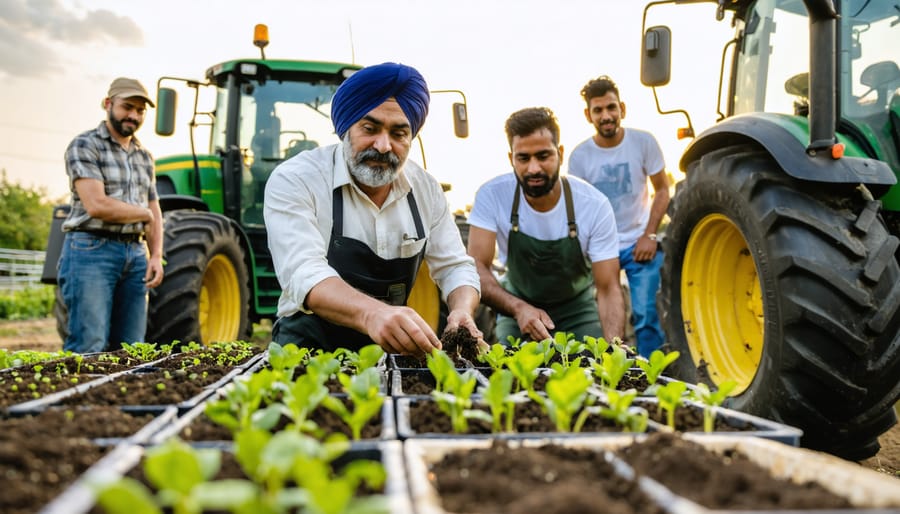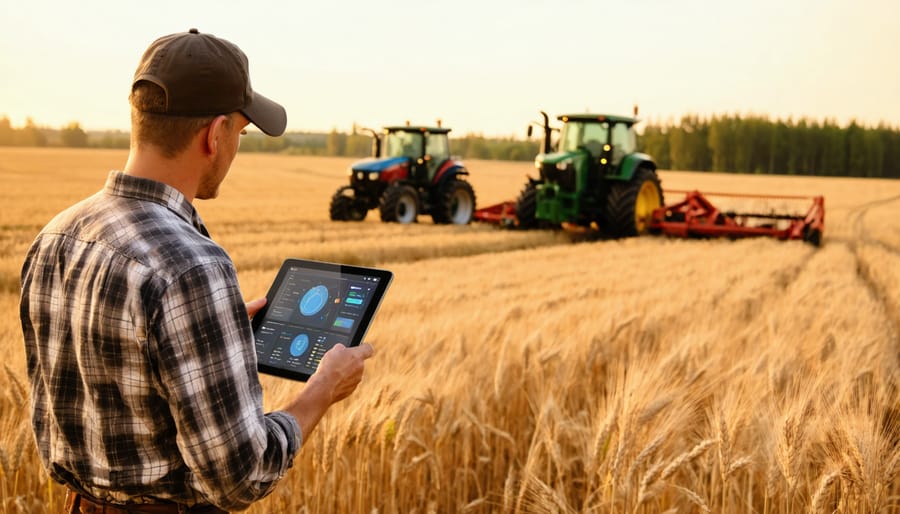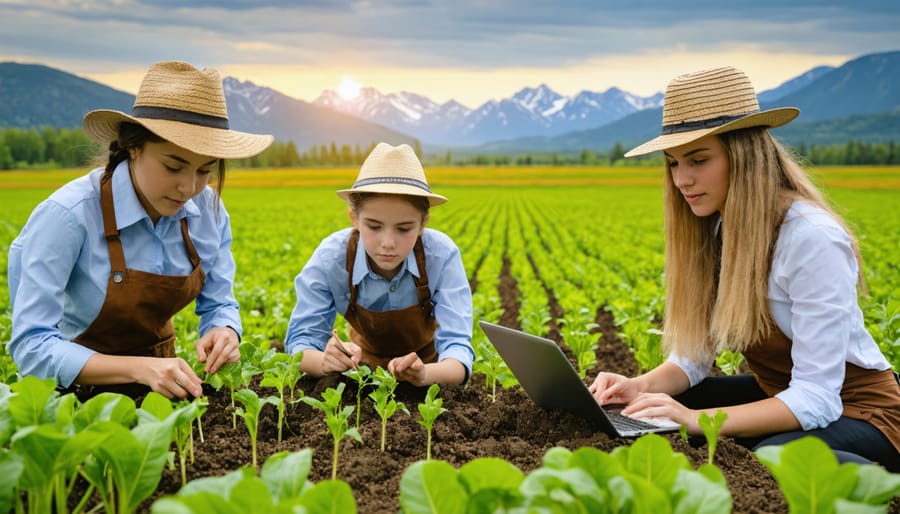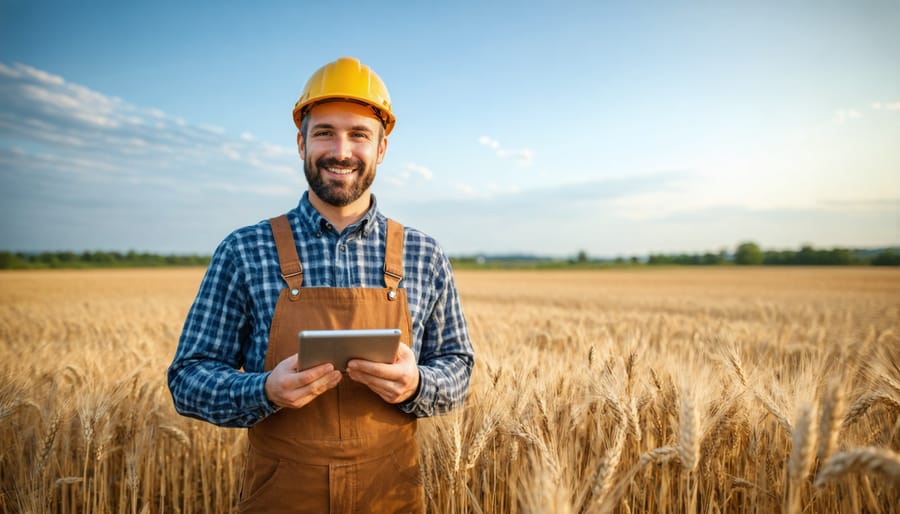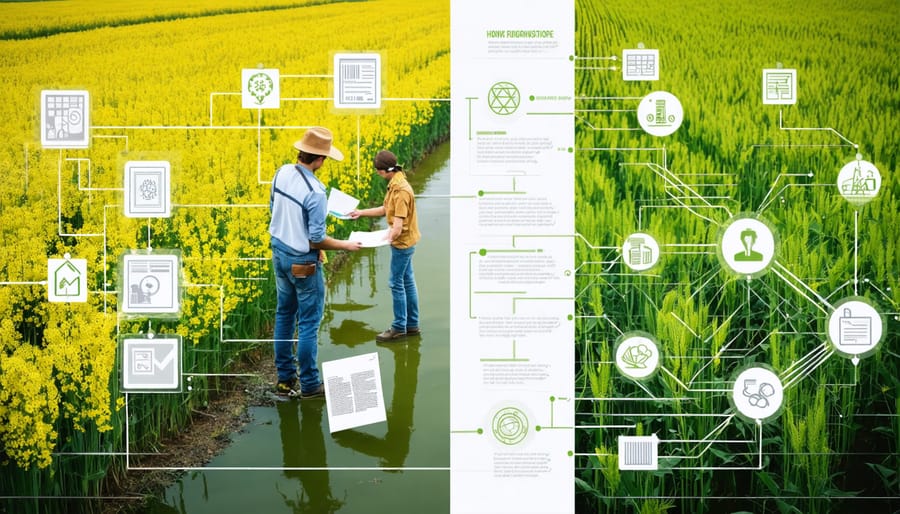Virtual reality training simulations are revolutionizing farm training across Alberta’s agricultural landscape, delivering immersive learning experiences that reduce operational risks and accelerate skill development. By replicating real-world farming scenarios—from equipment operation to crop management—VR technology enables producers to master complex procedures without risking valuable resources or equipment.
Canadian farmers implementing VR training report up to 40% faster skill acquisition and a 60% reduction in training-related accidents compared to traditional methods. These solutions prove particularly valuable during Alberta’s challenging winter months, allowing continuous training regardless of weather conditions.
The integration of VR simulation platforms addresses a critical challenge in modern agriculture: the need to train a new generation of tech-savvy farmers while preserving generations of practical farming wisdom. Through precise digital recreations of local farming conditions, equipment, and scenarios, these systems provide hands-on experience that translates directly to improved field performance and operational efficiency.
For Alberta’s agricultural community, VR training represents more than just technological advancement—it’s a practical tool for ensuring sustainable farm operations and maintaining Canada’s position as a global leader in agricultural innovation.
Why VR Training Makes Sense for Canadian Agriculture
Year-Round Learning Without Weather Constraints
In Alberta’s diverse climate, weather conditions can significantly impact traditional hands-on training opportunities. Virtual reality training offers a practical solution by creating consistent learning environments regardless of external conditions. Whether it’s -30°C in January or during spring seeding, farmers can maintain their skill development without interruption.
This technology is particularly valuable during our long winter months when outdoor training would typically be impossible. Farmers can practice equipment operation, learn new techniques, and refine their skills from the comfort and safety of an indoor facility. For instance, at the Olds College Smart Farm, agricultural students continue their practical training throughout the year using VR simulators.
The consistency of VR training environments also ensures that learning quality remains high regardless of seasonal challenges. Farmers can practice time-sensitive operations like seeding or harvesting whenever needed, preparing thoroughly before the actual season begins. This year-round accessibility has proven especially beneficial for new farmers and agricultural workers who need extensive practice time to build confidence and competency.
Many Alberta farming operations have reported significant improvements in worker readiness during peak seasons, attributing this to the ability to train and prepare staff during off-season periods using VR technology.
Risk-Free Equipment Operation Practice
Virtual reality training provides a secure environment where operators can familiarize themselves with complex agricultural machinery without the risks associated with hands-on learning. From combines to precision seeders, farmers can practice equipment operation extensively without concerns about fuel costs, maintenance wear, or potential accidents.
In Alberta, where many farming operations involve sophisticated machinery worth hundreds of thousands of dollars, VR simulation offers a cost-effective way to train new operators. Local farmer Mike Thompson from Red Deer shares, “We’ve reduced our equipment training accidents to zero since implementing VR training for our seasonal workers. They’re much more confident when they finally sit in the actual tractor cab.”
The virtual environment allows operators to experience various scenarios, from routine operations to emergency situations, without putting themselves or valuable equipment at risk. Weather conditions, mechanical failures, and complex terrain can all be simulated, helping operators develop muscle memory and decision-making skills before handling real machinery.
This risk-free approach is particularly valuable during peak seasons when equipment damage or operator errors could significantly impact harvest timing and crop yields.
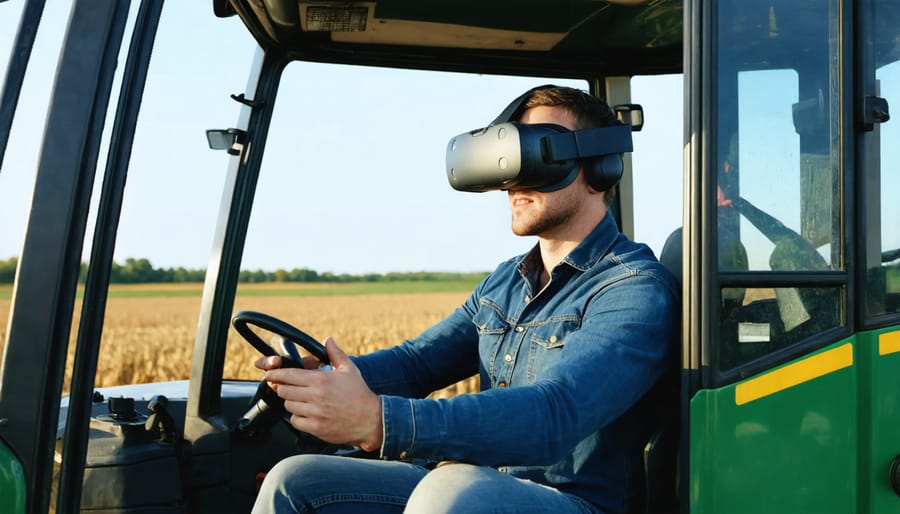
Real Applications in Alberta’s Fields
Precision Agriculture Training
Virtual reality training has revolutionized how Alberta farmers master precision agriculture techniques, particularly when operating GPS-guided equipment. By integrating VR simulations with digital agronomy technologies, farmers can practice complex operations in a risk-free environment before heading to the field.
Modern VR training modules allow operators to experience realistic scenarios while controlling virtual versions of their equipment. Farmers can practice everything from basic navigation to complex variable-rate applications, gaining confidence with precision farming tools without risking expensive machinery or crops. The simulations accurately replicate field conditions, weather variables, and equipment responses, providing hands-on experience with GPS guidance systems, auto-steering technology, and precision spraying equipment.
A notable success story comes from Red Deer County, where local farmer Sarah Thompson reduced her learning curve by 60% using VR training before implementing new precision agriculture equipment. “The virtual environment helped me understand the technology without the pressure of making mistakes in the field,” she explains.
Training scenarios include common challenges like maintaining straight lines while seeding, managing overlap in irregular field shapes, and adjusting application rates based on soil mapping data. The system provides immediate feedback, helping operators understand how their actions affect efficiency and resource usage.
Many agricultural equipment dealers across Alberta now offer VR training as part of their customer support services. These programs typically include modules for different seasons and operations, allowing farmers to prepare for specific tasks throughout the year. The investment in VR training has shown to improve operational efficiency and reduce the risk of costly mistakes during critical farming operations.
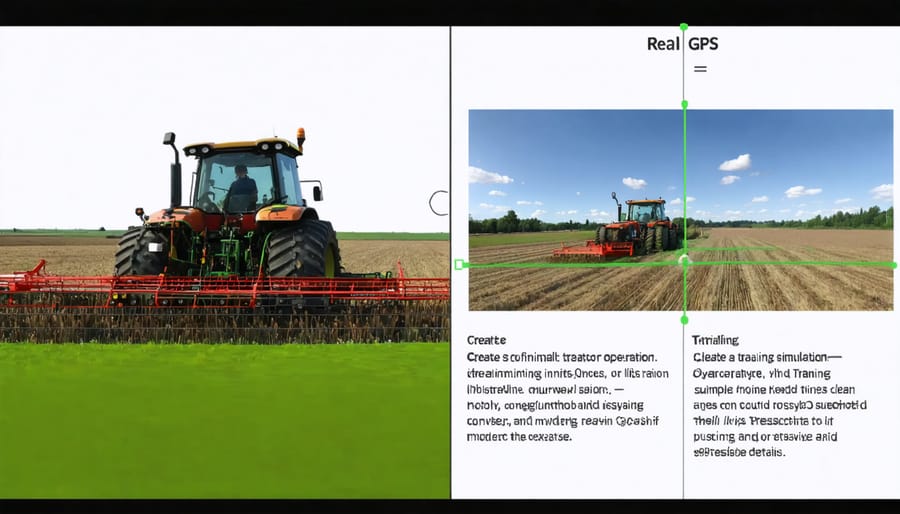
Sustainable Practice Implementation
Virtual reality training has revolutionized how we teach sustainable farming practices, making complex organic methods more accessible and engaging for Alberta’s farming community. Through immersive simulations, farmers can practice crop rotation, soil management, and integrated pest management techniques without risking actual crops or resources.
At the Edmonton Agricultural Innovation Centre, farmers are using VR headsets to learn companion planting techniques and optimal irrigation methods for water conservation. These simulations allow users to experience an entire growing season in just a few hours, demonstrating the long-term impacts of various sustainable practices on soil health and crop yields.
The Calgary-based Organic Farmers Collective reports that VR training participants are 40% more likely to implement sustainable practices successfully in their first season. Through virtual scenarios, farmers can visualize how different cover crops affect soil structure and practice natural pest control methods before applying them in the field.
Real-time feedback features help users understand the environmental impact of their decisions. For instance, farmers can see how reducing tillage practices influences soil organic matter levels over time, or how implementing buffer zones protects local watersheds.
The technology also facilitates seasonal planning, allowing farmers to test different crop combinations and rotation schedules virtually. This capability has proven particularly valuable for those transitioning to organic certification, as they can practice certification requirements and documentation procedures in a risk-free environment.
Local agricultural extension offices now offer VR training sessions, complete with region-specific scenarios that account for Alberta’s unique climate and growing conditions. These programs have created a collaborative learning environment where experienced organic farmers mentor newcomers through virtual demonstrations of successful sustainable practices.
Getting Started with VR Training
Essential Equipment and Setup
To get started with VR training simulation on your farm, you’ll need several key pieces of equipment. The basic setup includes a VR headset, which is the primary device for immersive learning. Popular options like the Meta Quest 2 or HP Reverb G2 offer excellent value for agricultural applications, with prices ranging from $400 to $800.
You’ll also need a dedicated space of at least 2 by 2 metres for movement during training sessions. This area should be clear of obstacles and have good lighting. For optimal performance, ensure you have a stable internet connection with minimum speeds of 25 Mbps for downloading training modules and updates.
Most modern VR systems require a computer or laptop with sufficient processing power. Look for devices with at least 16GB RAM and a dedicated graphics card. Many Alberta farmers have found success using gaming laptops, which offer both power and portability.
Additional equipment might include handheld controllers, which come standard with most VR sets, and safety equipment like non-slip mats. For group training sessions, consider a large display screen to share what the trainee sees with others.
Remember to set aside a clean, temperature-controlled storage area for your VR equipment. Many successful farming operations in Alberta have converted small office spaces or dedicated corners in their equipment sheds for their VR training stations.

Available Training Programs
Several cutting-edge VR training modules are now available to Canadian farmers through various agricultural training programs. The Alberta Agriculture Technology Centre offers comprehensive equipment operation simulations, allowing farmers to practice using complex machinery in a risk-free environment. These modules include combine harvester operation, precision seeding techniques, and specialized equipment maintenance procedures.
The Canadian Agricultural Partnership has funded the development of crop management simulations that enable farmers to practice pest identification, irrigation planning, and soil management strategies. These programs utilize high-resolution graphics and real-time weather data integration to create authentic learning scenarios.
Farm Safety Alberta provides emergency response training modules, helping farmers prepare for various safety scenarios without putting themselves at risk. Their VR programs include grain bin safety protocols, livestock handling procedures, and chemical safety practices specific to Canadian farming conditions.
Several equipment manufacturers, including John Deere and Case IH, offer specialized VR training modules for their latest machinery models. These programs are available through local dealerships across Alberta and can be accessed using standard VR headsets.
The University of Alberta’s Digital Agriculture Innovation Hub has also developed custom VR modules focusing on sustainable farming practices, including organic transition planning and regenerative agriculture techniques. These resources are available to farmers through regional agricultural offices and mobile training units.
Cost-Benefit Analysis
Initial Investment vs. Long-term Savings
While the initial investment in VR training equipment might seem substantial, many Alberta farmers have discovered significant long-term savings that justify the upfront costs. A typical VR training setup, including headsets, software, and basic hardware, ranges from $5,000 to $15,000 for a small operation.
However, the return on investment often becomes apparent within the first year. For example, the Morrison Family Farm in Red Deer reported a 30% reduction in equipment training costs after implementing VR simulation training. They saved approximately $12,000 annually by reducing the need for hands-on equipment training and minimizing the risk of costly mistakes during harvest season.
When you factor in reduced equipment wear and tear during training, lower insurance premiums due to improved safety records, and decreased fuel consumption during practice sessions, the savings can reach $20,000 to $30,000 annually for medium-sized operations. The Alberta Agricultural Training Institute found that farms using VR training reduced workplace incidents by 45% in their first year of implementation.
Several agricultural equipment dealers now offer financing options specifically for VR training systems, with some providing lease-to-own arrangements starting at $500 monthly. Additionally, government grants through the Canadian Agricultural Partnership can cover up to 50% of the initial investment, making the technology more accessible to smaller operations.
Available Funding and Support
Canadian farmers looking to implement VR training solutions have access to several funding opportunities and support programs. The Canadian Agricultural Partnership (CAP) offers grants of up to $50,000 for technology adoption, including virtual reality training systems. In Alberta, the Farm Technology Program provides matching funds of up to 70% for approved digital agriculture initiatives.
The Agricultural Clean Technology Program specifically supports innovations that enhance environmental sustainability, including VR training systems that reduce the carbon footprint of traditional training methods. Additional support for organic farmers is available through specialized grants focusing on sustainable farming practices and technology integration.
Local agricultural societies and cooperatives often provide group purchasing options and shared resource programs, making VR implementation more affordable for smaller operations. The Farm Credit Canada (FCC) offers flexible financing solutions specifically designed for agricultural technology investments, with competitive interest rates and extended repayment terms.
Regional innovation centers across Alberta provide technical support and consultation services, helping farmers evaluate and implement VR training solutions. Many of these centers offer demo sessions and pilot programs, allowing farmers to test VR systems before making significant investments. Additionally, agricultural colleges and extension services frequently partner with technology providers to offer reduced-cost training and implementation support.
Virtual reality training simulation represents a transformative opportunity for Canadian agriculture, offering a safe, efficient, and cost-effective way to develop essential farming skills. As we’ve seen through successful implementations across Alberta, farmers who embrace this technology are better equipped to handle complex machinery, manage seasonal operations, and respond to challenging situations with confidence.
The path forward for implementing VR training in your farming operation doesn’t have to be overwhelming. Start small by identifying one or two key areas where training would be most beneficial, such as equipment operation or safety protocols. Connect with local agricultural associations and technology providers who can guide you through the initial setup and help you access available funding programs.
Remember that the agricultural community thrives on shared knowledge and experience. Consider partnering with neighbouring farms to share VR training resources and costs. The Alberta Federation of Agriculture and various regional farming cooperatives are excellent resources for guidance and support in this journey.
As VR technology continues to evolve and become more accessible, the potential for enhanced training experiences will only grow. By taking steps now to incorporate virtual reality training into your agricultural operations, you’re not just investing in current efficiency – you’re preparing your farm for the future of Canadian agriculture.
Together, we can build a stronger, more skilled farming community through innovative training solutions that respect our traditional farming values while embracing the benefits of modern technology.


